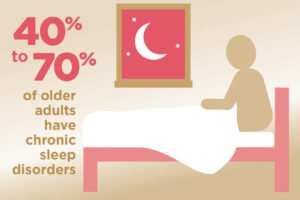Improve Your Sleep Quality
 Sleep is important for people of all ages to stay in good health. As people age, other health conditions can play a role in sleep patterns and lead to inadequate sleep that can have a further impact on the person’s health. Inadequate sleep can lead to an increased risk for a variety of health conditions.
Sleep is important for people of all ages to stay in good health. As people age, other health conditions can play a role in sleep patterns and lead to inadequate sleep that can have a further impact on the person’s health. Inadequate sleep can lead to an increased risk for a variety of health conditions.
According to the National Institution on Aging, it is considered a myth that older adults require less sleep than younger individuals. The amount of sleep that a person needs can decrease from infancy to adulthood, but this trend appears to stop around age 60. The American Academy of Sleep Medicine and the Sleep Research Society recommends adults age 18 or older get seven or more hours of sleep per night.
Numerous studies have found that lack of adequate sleep over time can increase a person’s risk of developing serious medical conditions including obesity, diabetes, and cardiovascular disease. Researchers estimate that between 40% and 70% of older adults have chronic sleep disorders and up to half of the cases may be undiagnosed. Chronic sleep disorders such as insomnia, nocturia, sleep apnea, or other sleep disruption conditions can interfere with their ability to get quality sleep. Interference in a person’s sleep pattern can impact their quality of life and daily activities.
Older adults can take steps to improve their sleep hygiene and develop habits to get quality sleep. Such habits include exercise, remove electronic devices from the bedroom, avoid large meals and caffeine before bedtime, and be consistent by going to bed at the same time each night and getting up at the same time each morning (including on the weekends).
To learn more about sleep hygiene, speak with a Community Resource Specialist: (408) 350-3200, option 1.
